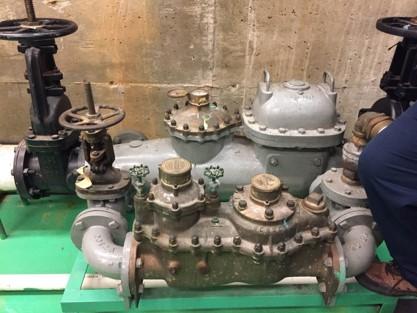Why Now?
Like any other mechanical device, a water meter is subject to deterioration over time, which impacts accuracy and reliability. The typical useful life of a water meter is 15 to 20 years. The average age of all large-diameter meters (above 3 inches) in WSSC Water's distribution system is 19 years. We appreciate your patience and cooperation in upgrading aging infrastructure and improving operational reliability.
Benefits of Water Meter Replacement
Replacing an outdated water meter provides several customer benefits:
- Improved reliability: Reduces the potential for maintenance issues.
- Accurate water usage readings: Ensures precise measurement of water consumption that can assist in monthly budgeting.
- Reduced estimated bills: Minimizes the need for estimated billing.
- Optimal fire flow protection: Enhances safety and compliance with fire regulations.
Our Trusted Partner
 UWS is handling site visits, testing and coordinating the water meter replacement. The work performed at these commercial and government properties is free to our customers.
UWS is handling site visits, testing and coordinating the water meter replacement. The work performed at these commercial and government properties is free to our customers.
What to Expect
- Repair Notification: UWS will inform our commercial and government customers if any repairs are necessary before replacement.
- Scheduling: UWS will coordinate to schedule the replacement at a convenient time.
Please note: The property owner is responsible for any on-site plumbing improvements related to this project. UWS will provide details on necessary on-property repairs at the end of their site visit.
Water Conservation Tips
Because new meters may register water usage more accurately, it's important to consider water conservation efforts. Saving water benefits the environment and reduces your water bill.
Commercial and government facilities have opportunities for water conservation that can significantly impact operations and save money, such as:
- Reduced flow rate faucet aerators and dual flush toilets.
- Prompt repair of leaking fixtures.
- Incorporating conservation efficiencies into the facility’s operations.
- Establish measurable goals, such as a percentage reduction in baseline water usage.
- Using a WSSC Water licensed plumber, conduct an audit on the existing water system to check for leaks and ensure it is operating efficiently.
- Prepare a demand forecast. Consider peak months for water demand and other variables, such as population growth and increases in the communities served.
- Develop a schedule and timetable for implementing water conservation strategies.
Conservation Resources
For further support on conservation efforts, explore resources provided by the Environmental Protection Agency and Maryland Department of the Environment:
Frequently Asked Questions
Your questions answered about the Large Meter Replacement Program.

 UWS is handling site visits, testing and coordinating the water meter replacement. The work performed at these commercial and government properties is free to our customers.
UWS is handling site visits, testing and coordinating the water meter replacement. The work performed at these commercial and government properties is free to our customers.